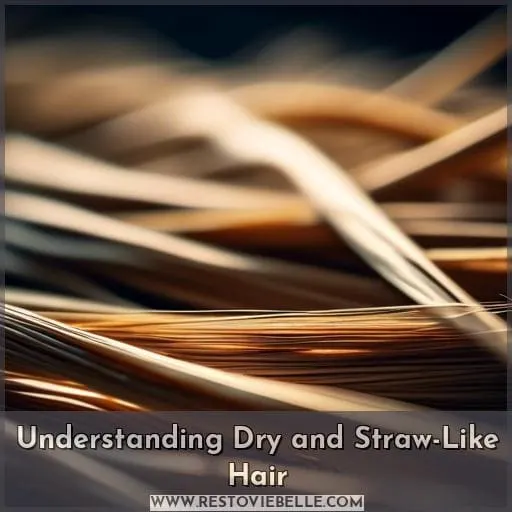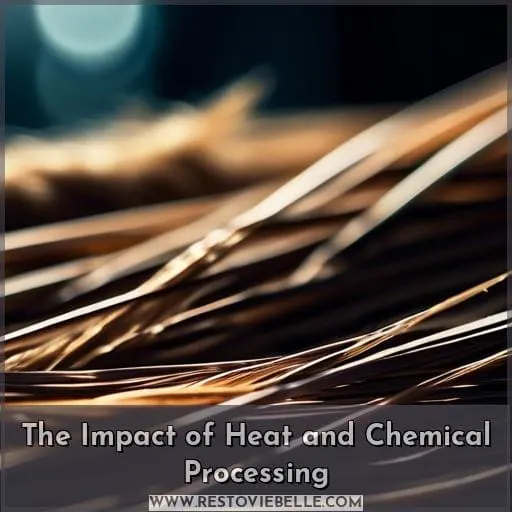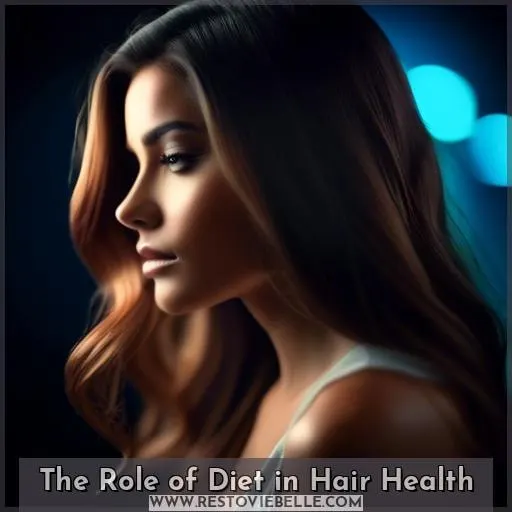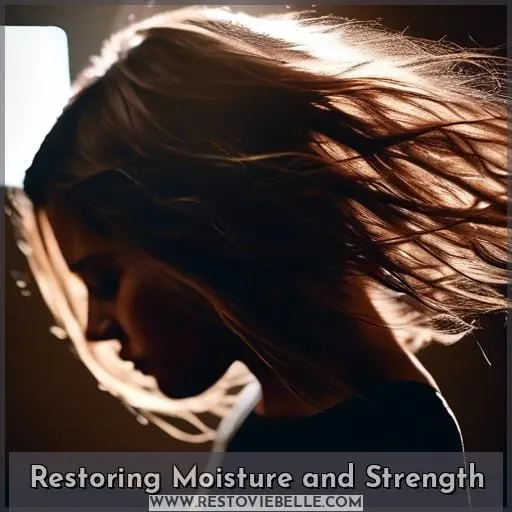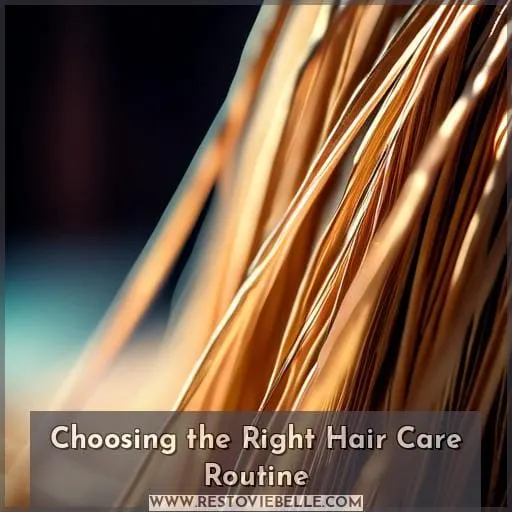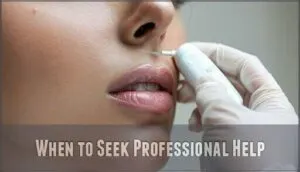This site is supported by our readers. We may earn a commission, at no cost to you, if you purchase through links.
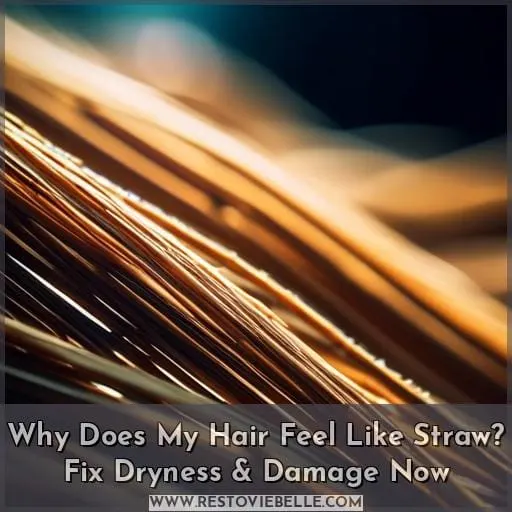
But fear not, as understanding the root causes is your first step towards reclaiming the luscious locks you long for. From the heat of your styling tools to the chemicals in your hair products, and even the food on your plate, every choice impacts your hair’s health.
Dive into this guide to unravel the mysteries behind straw-like hair and discover holistic strategies to restore its natural vitality and shine. Let’s embark on a journey to transform your dry, brittle strands into the soft, healthy hair you deserve.
Your hair feels like straw likely because it is dry or damaged, which can be caused by factors such as overuse of heat styling tools, harsh hair products, or lack of moisture.
Table Of Contents
- Key Takeaways
- Understanding Dry and Straw-Like Hair
- The Impact of Heat and Chemical Processing
- The Role of Diet in Hair Health
- Restoring Moisture and Strength
- Choosing the Right Hair Care Routine
- When to Seek Professional Help
- Frequently Asked Questions (FAQs)
- Can certain hairstyles contribute to my hair feeling like straw?
- How does the pH level of hair care products affect straw-like hair?
- Are there any specific vitamins or supplements that can prevent hair from feeling like straw?
- Can hormonal changes during different life stages make hair feel like straw?
- Is it possible for certain water treatments, like softening or filtration, to improve the texture of straw-like hair?
- Conclusion
Key Takeaways
- Heat styling and chemical treatments can significantly damage hair, altering its keratin structure, stripping away moisture and protective oils, and leaving it brittle and prone to breakage.
- Nutritional deficiencies, particularly in iron, zinc, and vitamin A, as well as health conditions like thyroid issues, can contribute to hair weakness and dryness.
- Restoring hair moisture and strength can be achieved through regular conditioning, the use of hair masks, hair bonding treatments, and the application of nourishing oils such as black seed oil.
- A proper hair care routine should include gentle cleansers, reduced washing frequency, consideration of hair porosity, and natural remedies like oil treatments to maintain healthy hair.
Understanding Dry and Straw-Like Hair
When your hair starts to feel more like straw than silk, it’s a clear signal that it’s suffering from damage and dehydration.
This condition can stem from a variety of sources, including environmental factors, over-reliance on styling tools, harsh chemical treatments, and even nutritional deficiencies.
Recognizing these causes is the first step toward rehabilitating your hair and restoring its natural luster and strength.
Environmental and Styling Factors
Your hair’s been through the wringer, hasn’t it? Sunbathing, that salty sea breeze, the allure of the perfect beach waves with a little help from your trusty flat iron—sounds like a regular day in paradise.
- Sun exposure: Think of it as a summer fling that left your hair feeling high and dry.
- Chlorine damage: Pool days are fun until your hair starts to feel like it’s been through a chemical warfare.
- Salt exposure: That beachy hair texture might just be your hair waving a white flag.
- Wind damage: It’s all fun and games until the wind does a number on your tresses.
- Mechanical damage: Heat styling is like that friend who borrows money and never pays back—trust them too much, and you’ll pay the price.
So, what’s a sun-kissed soul to do? It’s all about balance—protect those strands like you do your skin, and they’ll stick with you through thick and thin (and not the other way around).
Chemical Treatments and Products
Your love affair with bleach and those beachy waves might be leaving your locks more straw-like than luscious. It’s a harsh truth, but bleach is a bit of a double agent—while it lifts your hair to those heavenly hues, it’s also stripping away its strength and moisture.
And let’s not forget those sulfate shampoos and alcohol-based gels; they’re like the frenemies of hair care, promising cleanliness and hold but leaving your hair parched and brittle in their wake.
Chlorine pools and salt exposure are no better, acting like kryptonite to your once-supple strands. It’s a cocktail of hair damage and dryness that can leave your mane feeling like a scarecrow’s headpiece.
So, if you’re dreaming of soft, silky tresses, it might be time to break up with these chemical treatments and hair products that are turning your hair into straw-like strands.
Nutritional Deficiencies and Health Conditions
Continuing from the woes of chemical treatments, let’s dive into the nitty-gritty of your hair’s health: nutrition and underlying health conditions.
You know the drill—what you put in your body is what you get out. If your mane’s more straw than silk, it might be screaming for a buffet of hair vitamins and a proper hair diet. Think of your locks like a garden; without the right nutrients, they’ll just wither away.
Nutritional deficiencies can leave your hair parched, while health conditions like thyroid issues can turn your tresses into a brittle mess. So, don’t skimp on the hair water intake or hair protein—your crowning glory depends on it.
If your hair’s still throwing a fit despite your best efforts, it might be time to chat with a doc to rule out any sneaky health conditions.
The Impact of Heat and Chemical Processing
The impact of heat and chemical processing on hair health is significant and multifaceted. When you frequently use heat styling tools or undergo chemical treatments, you’re exposing your hair to conditions that can lead to dryness, damage, and a straw-like texture.
Heat styling, especially at high temperatures, can alter the structure of your hair’s keratin, leading to loss of elasticity and strength. Similarly, chemical treatments can change your hair’s natural protein structure, making it more susceptible to damage.
Both practices strip away moisture and protective oils, leaving your hair brittle, dull, and prone to breakage. To maintain your hair’s health while achieving your desired style, it’s crucial to use protective products, lower the temperature of your styling tools, and consider natural styling alternatives.
Damage From Heat Styling Tools
When you’re aiming for those sleek blowouts or pin-straight locks, remember that heat styling tools can be double-edged swords. Cranking up the temperature settings might give you that perfect look, but it’s also inviting trouble.
Imagine your hair’s cuticle as a delicate flower in the sun—too much heat, and it wilts.
Always use a heat protectant before styling; it’s like armor for your hair. And consider air drying your mane occasionally. It’s like giving your hair a little vacation. Plus, embracing your natural texture can be a fun change of pace.
Effects of Chemical Hair Treatments
Continuing from the woes of heat styling, let’s dive into the havoc wreaked by chemical hair treatments. Picture this: you’re chasing that dreamy hair color, and bam! You’re hit with the reality of bleaching damage.
It’s like inviting a tornado into your hair, disrupting the peace of your strands. Bleaching can turn your hair’s porosity into a sponge, soaking up and spitting out moisture and color faster than you can say oops.
And if you’ve ever experienced the sting of chemical burns, you know it’s no joke.
But fear not, there’s a silver lining. With the right protein treatments, your hair can bounce back from the brink. Think of it as a gym session for your hair, pumping up those weakened fibers. And let’s not forget the holy grail of hair care: conditioning.
It’s like a soothing balm after the storm, bringing back softness and manageability. So, while you might be tempted to go full-on mad scientist with your hair styling and treatments, remember that moderation and proper care are your best allies in maintaining healthy locks.
The Role of Diet in Hair Health
Your diet plays a crucial role in maintaining the health of your hair.
If your hair feels like straw, it might be signaling a deficiency in essential vitamins, minerals, protein, or hydration.
Ensuring your diet is rich in these nutrients can help restore strength and moisture to your hair, preventing it from becoming dry and brittle.
Essential Vitamins and Minerals
Your locks are literally hungry for the right nutrients! Just like a plant needs water and sunlight, your hair craves a cocktail of vitamins and minerals to flourish. Iron, zinc, and those trusty B vitamins are like the fertilizer that helps your hair grow strong and avoid breakage.
Think of vitamin A as the sunshine, giving life to your cells, including those in your hair follicles. But remember, too much of a good thing can backfire – overdoing vitamin A might actually lead to hair loss.
So, if you’re dreaming of Rapunzel-esque tresses, don’t just rely on fancy shampoos. Dive into a rainbow of foods that pack a nutritional punch for your hair. Your diet could be the hero your hair never knew it needed, turning straw-like strands into silk.
And hey, if you’re not sure where to start, a chat with a nutritionist could be your golden ticket to luscious locks.
Protein and Hydration for Hair Strength
Protein is like the gym for your hair, building resilience against breakage. Without enough protein, your locks might snap under pressure. Hydration is the water bottle at that gym, essential to prevent parched and brittle hair.
If your hair feels like hay, consider a protein-packed feast with deep conditioner. Remember, too much protein can leave hair stiff—balance is key! To maintain scalp health and promote hair growth, alternate between protein supplements and hydrating hair masks.
This approach helps avoid brittle hair, leaving you with strong, flexible locks like bamboo in the breeze.
Restoring Moisture and Strength
When your hair feels like straw, it’s a cry for help signaling deep dryness and damage.
Restoring moisture and strength is crucial. This can be effectively achieved through regular conditioning, the use of hair masks, and hair bonding treatments and oils.
These methods work together to replenish hydration, repair damaged bonds within the hair structure, and seal in moisture.
Importance of Conditioning and Hair Masks
As you’ve learned about the vital role diet plays in maintaining luscious locks, let’s dive into the game-changing world of conditioning and hair masks.
Think of conditioner as your hair’s knight in shining armor, swooping in to smooth down those pesky flyaways and add a silky sheen that turns heads. But don’t stop there—hair masks are like a spa day for your strands, infusing them with a cocktail of nourishing ingredients that can bring even the most parched hair back to life.
Whether you’re whipping up a DIY concoction or indulging in a store-bought treat, incorporating a deep conditioning routine into your hair care regimen is a must. Aim for a deep conditioning frequency that suits your hair’s thirst level, and don’t forget to show your scalp some moisturizing love too.
With the right balance of conditioning and hair masks, you’ll say goodbye to straw-like tresses and hello to a mane that’s as lush as a tropical oasis.
Hair Bonding Treatments and Oils
Continuing from the importance of conditioning and hair masks, let’s dive into hair bonding treatments and nourishing oils. These are your secret weapons against the why does my hair feel like straw conundrum.
Hair bonding treatments like Olaplex No. 0 work wonders by repairing the disulfide bonds in your hair, which are often broken during chemical processing or heat styling. Think of them as the paramedics for your damaged hair, rushing to the scene to resuscitate those lifeless strands.
Now, let’s not forget about the role of oils. A knight in shining armor for your tresses, black seed oil, for instance, is packed with amino acids that can help to lock in moisture and fortify your hair.
It’s like a hydration elixir that can bring even the most parched locks back to life. So, if you’re battling with hair that feels like a bale of hay, these treatments and oils could be your hair loss solutions, turning straw into silk with every use.
Choosing the Right Hair Care Routine
When your hair feels like straw, selecting the right hair care routine is crucial to restoring its health and vitality.
Opt for gentle, nourishing cleansers that won’t strip your hair of its natural moisture.
Consider reducing the frequency of your washes to maintain your hair’s natural oils.
These steps are foundational in combating dryness and bringing softness and shine back to your hair.
Selecting Gentle and Nourishing Cleansers
When it comes to giving your hair the tender love and care it deserves, picking the right cleanser is like choosing the perfect comfort food—it should feel just right and leave you satisfied. Imagine swapping out that harsh, stripping shampoo for a gentle, sulfate-free option that’s like a soothing balm for your tresses.
These nourishing cleansers are the unsung heroes, packed with natural ingredients and pH-balanced formulas that respect your hair’s natural state.
Think of your hair as a delicate fabric that needs a specific kind of wash. You wouldn’t use a rough detergent on silk, right? So why treat your hair any differently? Embrace the gentle touch of shampoos that skip the sulfates and instead, shower your hair with kindness, using ingredients that whisper sweet nothings to your scalp and strands.
Reducing Washing Frequency
Washing your hair too often can strip it of its natural oils, leading to dryness and breakage.
- Embrace Your Natural Oils: They’re your hair’s best friend, reducing buildup and keeping strands supple.
- Be a Water Quality Connoisseur: Hard water can be harsh, so a filter might just be your mane’s new hero.
- Test the Waters of Hair Porosity: Understanding your hair’s thirst can guide you to the right hydration routine.
- Natural Remedies to the Rescue: Sometimes, the best solutions are the simplest—like a good old-fashioned oil treatment to prevent breakage.
When to Seek Professional Help
When your hair persistently feels like straw despite trying various home remedies, it’s time to seek professional help.
This could indicate underlying medical conditions such as hypothyroidism or nutritional deficiencies that only a healthcare provider can diagnose and treat effectively.
A specialist can offer a holistic approach, examining your hair and scalp health, dietary habits, and overall lifestyle to pinpoint the root cause of the dryness and damage, guiding you towards targeted treatments and lifestyle adjustments.
Persistent Dryness and Damage
If your mane still mimics a haystack despite your best efforts, it’s time to call in the cavalry. Hair breakage and split ends can be a cry for help from your scalp, signaling it’s time for professional intervention.
Sun exposure isn’t just for beach days; it can also toast your tresses. A pro can help turn the tide on your hair growth woes.
| Signs to Watch | Professional Solutions |
|---|---|
| Unmanageable Split Ends | Tailored Haircut |
| Excessive Hair Breakage | Strengthening Treatments |
| Itchy, Flaky Scalp Health | Scalp Analysis & Care |
| Faded, Sun-Damaged Hair | Protection & Repair Regimens |
Suspected Underlying Medical Conditions
If you’ve been battling persistent dryness and damage, despite all the tender loving care you’ve lavished on your locks, it might be time to consider that an underlying medical condition could be the culprit.
- Unexplained Changes: If your hair texture has changed drastically without any clear reason, it might be time to dig deeper.
- Stubborn Symptoms: When your hair refuses to respond to any treatments or changes in routine, it’s a sign that something else might be at play.
- Other Symptoms: If you’re also experiencing other health issues, like fatigue or changes in appetite, it could be related to your hair woes.
Medical conditions like hypothyroidism or hypoparathyroidism can manifest as dry, brittle hair. Diagnostic tests can help identify these underlying causes, and a specialist consultation can guide you towards the right treatment options.
Don’t brush off the signs; if your mane’s misery persists, let a healthcare professional comb through the possibilities.
Frequently Asked Questions (FAQs)
Can certain hairstyles contribute to my hair feeling like straw?
Yes, certain hairstyles can indeed make your hair feel like straw.
Especially those that pull tightly or require frequent heat styling.
This can lead to damage and moisture loss.
How does the pH level of hair care products affect straw-like hair?
Hair care products with a high pH can swell and lift the hair cuticle, leading to tangles, frizz, and a straw-like texture.
Stick to low pH products to keep those cuticles closed and your mane smooth as silk!
Are there any specific vitamins or supplements that can prevent hair from feeling like straw?
Like a garden thirsting for water, your hair craves certain nutrients to bloom back to life.
Vitamins A, C, E, biotin, and iron are your secret weapons against straw-like hair.
Each plays a unique role in hydrating and strengthening your mane.
Can hormonal changes during different life stages make hair feel like straw?
Yes, hormonal changes during different life stages can indeed make your hair feel like straw.
These shifts, like the rollercoaster ride of puberty, the hormonal cocktail of pregnancy, or the estrogen dip in menopause, can mess with your hair’s mojo, leading to dry, brittle locks.
Is it possible for certain water treatments, like softening or filtration, to improve the texture of straw-like hair?
Yes, water treatments like softening or filtration can indeed improve the texture of straw-like hair.
Soft water, being low in minerals, makes hair feel softer and silkier, though it might leave it feeling a bit heavy.
Filters that remove hard water minerals can prevent dryness and damage, leading to healthier-looking hair.
Conclusion
Imagine you’ve been nurturing a plant, ensuring it gets enough sunlight and water, but despite your efforts, the leaves turn brittle and lose their luster.
Similarly, your hair might feel like straw when it’s parched and in need of tender care. To combat this, you’ve learned about the detrimental effects of heat styling and harsh chemicals, as well as the importance of a nutrient-rich diet for maintaining hair health.
If your hair still feels like straw, consider consulting a professional to explore potential underlying health issues. Your journey to silky, resilient hair is a commitment to holistic care and patience.

